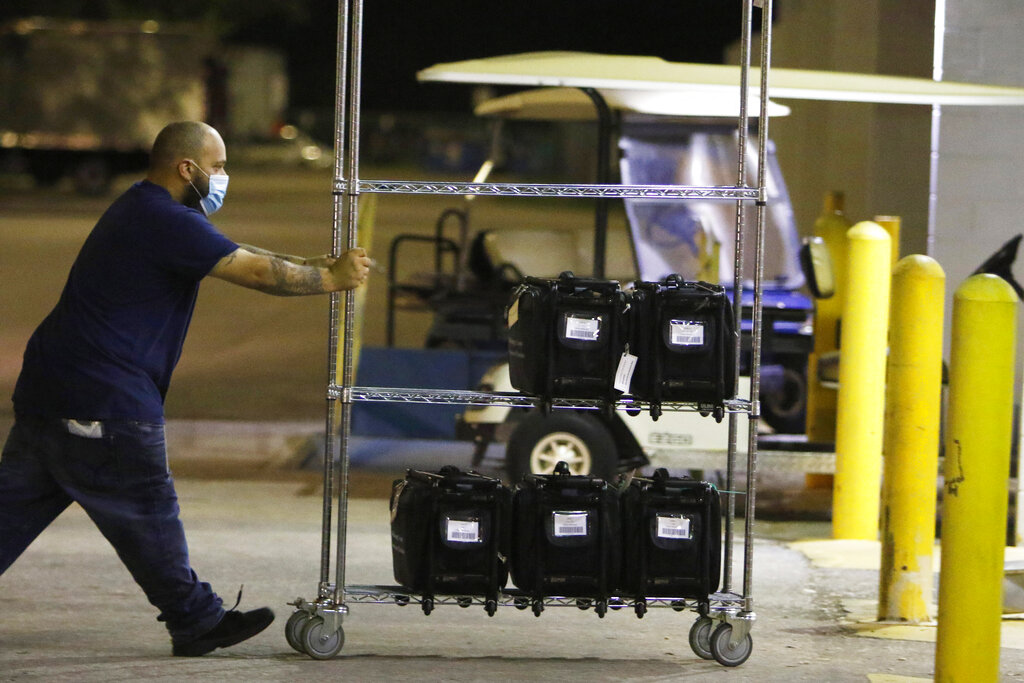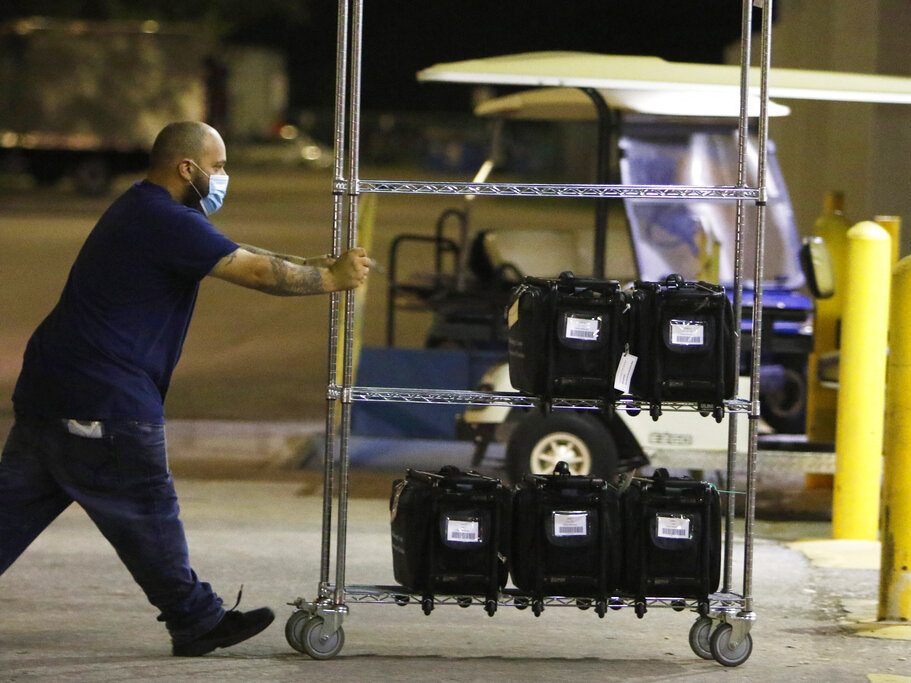
Staff at the Hillsborough County Supervisor of Elections receive and count ballots late into the night in Tampa, Fla., Tuesday, Nov. 3, 2020. (Luis Santana/Tampa Bay Times via AP)
WASHINGTON (AP) — President Donald Trump and Democratic challenger Joe Biden were locked in tight races in battleground states across the country Tuesday night as they concluded an epic campaign that will shape America’s response to the surging pandemic and foundational questions of economic fairness and racial justice.
Trump won the key battlegrounds of Ohio and Iowa while Biden picked up Minnesota and New Hampshire, a pair of modest prizes that the president tried to steal from the Democrats. But races were too early to call in the most fiercely contested and critical states on the map, including Florida, North Carolina, Georgia and Pennsylvania.
Americans made their choices as the nation faced a confluence of historic crises with each candidate declaring the other fundamentally unfit to navigate the challenges. Daily life has been upended by the coronavirus, which has killed more than 232,000 Americans and cost millions of jobs.
Millions of voters braved their worries about the virus — and some long lines — to turn out in person, joining 102 million fellow Americans who voted days or weeks earlier, a record number that represented 73% of the total vote in the 2016 presidential election.
Early results in several key battleground states were in flux as election officials processed a historically large number of mail-in votes. Democrats typically outperform Republicans in mail voting, while the GOP looks to make up ground in Election Day turnout. That means the early margins between the candidates could be influenced by which type of votes — early or Election Day — were being reported by the states.
Trump and Biden were locked in a tight race in Florida, and it was too early for The Associated Press to call the perennial battleground state. Florida has a history of close elections, including the state’s 2018 governor’s race, which went to a recount. The AP was waiting on more votes to be counted in south Florida, including Miami-Dade County, the largest county in the state.
Control of the Senate was at stake, too: Democrats needed to net three seats if Biden captured the White House to gain control of all of Washington for the first time in a decade. Senate Majority Leader Mitch McConnell of Kentucky won reelection in an early victory for the Republicans, and GOP Sen. Lindsey Graham of South Carolina, a close Trump ally, fought off a fierce challenge to hang onto his seat.
The parties traded a pair of seats in other early results: Democratic former Colorado Gov. John Hickenlooper defeated incumbent Sen. Cory Gardner, and in Alabama Republican Tommy Tuberville knocked off Sen. Doug Jones. The House was expected to remain under Democratic control.
As the results began to come in, the nation braced for what was to come — and an outcome that might not be known for days.
Biden was watching from home with family and close aides. Trump was watching the results come in with a small group of allies in the White House residence as other staff and advisers floated between a party at the White House residence and various offices throughout the executive mansion complex.
Outside, a new anti-scaling fence was erected around the White House, and in downtowns from New York to Denver to Minneapolis, workers boarded up businesses lest the vote lead to unrest.
With the worst public health crisis in a century still fiercely present, the pandemic — and Trump’s handling of it — was the inescapable focus for 2020.
For Trump, the election stood as a judgment on his four years in office, a term in which he bent Washington to his will, challenged faith in its institutions and changed how America was viewed across the globe. Rarely trying to unite a country divided along lines of race and class, he has often acted as an insurgent against the government he led while undermining the nation’s scientists, bureaucracy and media.
Biden spent the day last-minute campaigning in Scranton, Pennsylvania, where he was born, and in Philadelphia with a couple of local stops in Wilmington, Delaware, where he was spending Election Night.
The president began his day on an upbeat note, predicting that he’d do even better than in 2016. But during a midday visit to his campaign headquarters, he spoke in a gravelly, subdued tone.
“Winning is easy,” Trump told reporters. “Losing is never easy, not for me it’s not.”
Trump left open the possibility of addressing the nation Tuesday night, even if a winner hadn’t been determined. Biden was also scheduled to give a nighttime speech from Wilmington.
“I’m superstitious about predicting what an outcome’s gonna be until it happens … but I’m hopeful,” said Biden. “It’s just so uncertain … you can’t think of an election in the recent past where so many states were up for grabs.”
The momentum from early voting carried into Election Day, as an energized electorate produced long lines at polling sites throughout the country. Turnout was higher than in 2016 in numerous counties, including all of Florida, nearly every county in North Carolina and more than 100 counties in both Georgia and Texas. That tally seemed sure to increase as more counties reported their turnout figures.
Voters braved worries of the coronavirus, threats of polling place intimidation and expectations of long lines caused by changes to voting systems, but appeared undeterred as turnout appeared it would easily surpass the 139 million ballots cast four years ago.
No major problems arose on Tuesday, outside the typical glitches of a presidential election: Some polling places opened late, robocalls provided false information to voters in Iowa and Michigan, and machines or software malfunctioned in some counties in the battleground states of Ohio, Pennsylvania, Georgia and Texas.
The cybersecurity agency at the Department of Homeland Security said there were no outward signs by midday of any malicious activity.
The record-setting early vote — and legal skirmishing over how it would be counted — drew unsupported allegations of fraud from Trump, who had repeatedly refused to guarantee he would honor the election’s result.
With the coronavirus now surging anew, voters ranked the pandemic and the economy as top concerns in the race between Trump and Biden, according to AP VoteCast, a national survey of the electorate.
Voters were especially likely to call the public health crisis the nation’s most important issue, with the economy following close behind. Fewer named health care, racism, law enforcement, immigration or climate change
The survey found that Trump’s leadership loomed large in voters’ decision-making. Nearly two-thirds of voters said their vote was about Trump — either for him or against him.

